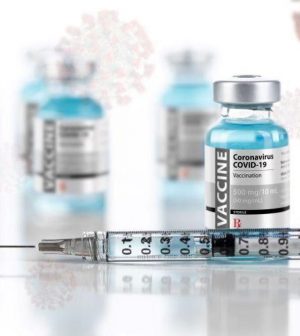- 10 Strategies to Overcome Insomnia
- Could Artificial Sweeteners Be Aging the Brain Faster?
- Techniques for Soothing Your Nervous System
- Does the Water in Your House Smell Funny? Here’s Why
- Can a Daily Dose of Apple Cider Vinegar Actually Aid Weight Loss?
- 6 Health Beverages That Can Actually Spike Your Blood Sugar
- Treatment Options for Social Anxiety Disorder
- Understanding the Connection Between Anxiety and Depression
- How Daily Prunes Can Influence Cholesterol and Inflammation
- When to Take B12 for Better Absorption and Energy
More Evidence COVID Shots Less Effective for People With Weak Immune Systems

Transplant patients and certain other folks may need four shots of COVID-19 vaccine for optimal protection, new research suggests.
People with weakened immune systems who’ve received both doses of two-dose COVID-19 vaccines aren’t adequately protected against severe illness. They should be given a third shot plus a booster, according to the study.
“These findings indicate that while two doses of mRNA COVID-19 vaccines are beneficial in immunocompromised individuals, they are significantly less protected from severe disease than people with normal immune systems,” said study lead author Dr. Peter Embí. He is president of the Regenstrief Institute in Indianapolis and associate dean for informatics and health services research at Indiana University School of Medicine.
“Since they are less protected after a two-dose series, those who are immunocompromised should receive an additional dose and a booster, take additional precautions like masking when in public, and, if they get infected, they should seek treatment with proven therapies that can protect against progression to severe disease and the need for hospitalization,” Embí said in a university news release.
In general, people who are immunocompromised have an increased risk for severe COVID-19 outcomes.
The researchers analyzed data on more than 89,000 hospitalizations in nine U.S. states and found that the two-dose mRNA vaccines from Pfizer and Moderna were 90% effective at protecting against COVID-related hospitalization in people with healthy immune systems, but only 77% effective who had weakened immunity due to a range of health conditions.
The investigators also found that the vaccines’ effectiveness varied significantly between subgroups of immunocompromised people.
For example, the vaccines were less effective in organ or stem cell transplant patients. However, they were more protective in people with rheumatologic or inflammatory disorders, according to the findings.
The differences between those with healthy immune systems and those with weakened immune systems were similar across age groups.
The results appear in the Nov. 3 Morbidity and Mortality Weekly Report from the U.S. Centers for Disease Control and Prevention.
More information
The U.S. Centers for Disease Control and Prevention has more on immunocompromised people and COVID-19 vaccines.
SOURCE: Indiana University, news release, Nov. 2, 2021
Source: HealthDay
Copyright © 2026 HealthDay. All rights reserved.










